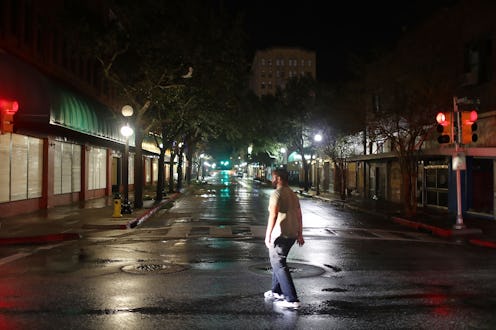
After Hurricane Harvey made landfall northeast of Corpus Christi on Friday night, it became clear that the grave weather predictions were accurate — the storm would cause immense damage. Now, people who didn't evacuate may need to find hurricane shelters, because Harvey is hitting Texas with massive amounts of rain and high-speed winds.
As the sun came up early Saturday morning, the country witnessed the devastation Harvey caused, especially in Texas. As The Washington Post reported, Harvey is the strongest hurricane to hit the United States since Hurricane Wilma over ten years ago in 2005.
“The storm surge, coupled with the deluge of rain, could easily lead to billions of dollars of property damage and almost certainly loss of life,” Texas Governor Greg Abbott wrote to Trump in request of a disaster proclamation. “It is not hyperbole to say that if the forecast verifies, Texas is about to experience one of the worst natural disasters in the history of the state.”
Wind speeds on Friday night upon landfall reached 130 miles per hour, and though the National Hurricane Center confirmed that Harvey has downsized to a Category 1 hurricane, the threat is far from over. Knowing where your local shelter is and having a disaster plan in place will be of the utmost importance.
To find the closest hurricane shelter, you can download the Federal Emergency Management Agency (FEMA) mobile app. In addition to helping you find the nearest shelter, the app will send National Weather Service alerts, as well as safety and survival tips. It also allows you to create a customized emergency checklist.
According to TIME, Airbnb could also be an option if you've evacuated your house and need somewhere to stay. If you're an evacuee and check in before Sept. 1, all service charges will be waived. The company's website released a statement:
Collaborating with regional disaster relief organizations in advance of an event allows us to reach a broader audience and help more people during the actual event. That is why we are pleased to partner with local government agencies and disaster relief organizations to help the Airbnb community and the cities prepare for local emergencies.
The American Red Cross website is also a great tool for locating hurricane shelters. If you visit its website, you can simply type your address into the finder to find the nearest shelter. With more and more shelters opening up as the storm moves inland, there's bound to be one nearby.